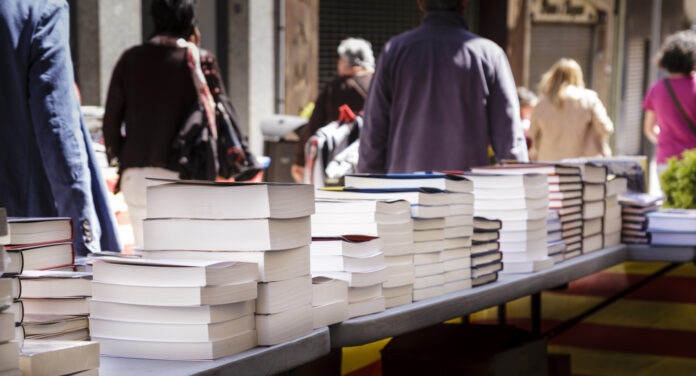The Asian American Literature Festival (AALF) is scheduled to return this September after the Smithsonian Asian Pacific American Center unilaterally canceled it last year. But this year’s festival will feature some major changes: Events offered will be held in multiple locations—either in person or hybrid—and include events by partners in New Zealand and Australia, marking the festival’s first year to expand globally. Most significantly, the festival will no longer rely on a primary institutional sponsor as it did in the past, which organizers say helps create a better festival grounded in community and inclusivity.
Some organizers previously voiced suspicions that the festival had been shut down by the Smithsonian due to certain programming such as the Trans and Nonbinary Reading Room that was set to take place last year. At the time, the Smithsonian said the festival was postponed due to logistical shortcomings, a claim disputed by festival organizers.
“We were, of course, disappointed by the cancellation last year. But I think the festival has always, whether it’s hosted at the Smithsonian or otherwise, been rooted in collective organizing,” said Jafreen Uddin, executive director of the Asian American Writers’ Workshop (AAWW), a longtime community partner of the festival. “One thing that we’ve been thinking a lot about, especially in this time, is … how do we create something that’s bigger and better than years past?”
That collective organizing kicked into high gear after the festival’s sudden cancellation in 2023. Under the AALF Collective, festival partners salvaged what they could of the events and pivoted to smaller gatherings in Washington, D.C. The result was a three-day event titled “GHOSTED WORLD: An Uncancelled Asian American Literature Festival.” The festival featured a six-hour reading marathon, literary karaoke, and a healing room, all free to the public. In November, LGBTQIA+ organizers and authors hosted an online forum to honor trans and nonbinary authors whose works couldn’t be showcased due to the festival’s cancellation. The two-hour virtual reading, titled “Unghosted! A Virtual Reading Room Celebrating Asian Diasporic Trans, Nonbinary, and Gender-Expansive Writers,” featured authors such as Andrea Abi-Karam, Ashna Ali, Celeste Chan, Zeyn Joukhadar, Trish Salah, and Willy Wilkinson, among others.
The festival’s shuttering last year unleashed a logistical nightmare, and authors and organizers suffered tens of thousands of dollars in financial losses.
“It was really devastating to have the festival canceled with one major funder. I think one of the things that we’ve been working towards is not letting that happen again,” said Ching-In Chen, the writer-organizer who curated the trans and nonbinary reading room that was canceled and a co-curator of the subsequent “Unghosted” event. “So really, relying on a more decentralized structure to come together. And I think that one of the things that’s really exciting about this year’s festival is that it’s a step towards making that happen.”
One way Chen is doing that work is through Reorienting Reads, a collective of queer writers and organizers that aims to amplify the voices of trans, non-binary, intersex, and gender-expansive authors within the Asian American diaspora through educational resources and community events. The collective, whose members are scattered across the U.S., was borne out of the organizing done in the aftermath of last year’s canceled event.
This year’s literary festival is scheduled to take place from Sep. 14 to 22, under the unifying theme “Cosmic Kinship,” with in-person and virtual events at various locations organized by community partners. Participating cities include Athens and Atlanta, Georgia; Champaign-Urbana, Illinois; Honolulu; Los Angeles; Minneapolis; New York; San Francisco; and Seattle. There will also be events organized internationally by Slow Currents, the festival’s literary partner in New Zealand and Australia.
According to Chen, this year’s festival is an opportunity to shape a more accessible event that is grounded in community. For instance, Reorienting Reads convened two separate visioning sessions to gather feedback about what events community members want to see from the group. “One of the things that really came out of that was a need for community space,” Chen said. Reorienting Reads will host a hybrid reading event on Sept. 18, with in-person gatherings split between Seattle and New York City and an online option for those outside of both cities. The collective will also co-host a pop-up bookstore centering works by trans and gender-expansive creatives in Seattle.
More festival programs are being developed by other community partners. Los Angeles-based publishing house Kaya Press will host a literaoke event with participating artists and live musicians, co-produced with community arts group Tuesday Night Project on Sept. 17, and a book launch for Jason Magabo Perez followed by readings with multiple authors, which will be co-hosted alongside literary nonprofit Beyond Baroque on Sept. 19 (both events will be in person and live-streamed). The AAWW will also host a slew of hybrid events, including an in-person marathon reading highlighting Palestinian writers on Sept. 21 in Manhattan, co-curated with Reorienting Reads. And literary journal The Georgia Review will host two in-person readings with Pulitzer Prize-winning poet Brandon Som and author Siwar Masannat in Atlanta and Athens on Sept. 15 and 16, respectively. The festival’s decentralized structure affords organizers the freedom to curate events based on their respective visions and their communities’ expectations. However, one challenge is ensuring the festival’s financial needs are met without the backing of a major institutional sponsor.
“A big part of it is the funding piece. Who will be funding the programming, and how will that move forward in a collective way,” Chen said. “That’s one of the reasons why the festival is smaller this year because I think we’re kind of regrounding in either our local community or seeing what can be done with what we have.”
Despite the challenges, Uddin of the AAWW believes the festival’s new structure is an opportunity to cement her organization’s mission even further. “I think our hope this year is to do what the festival has always done in terms of building community, creating spaces for Asian American writers and readers to gather and to conspire,” she said.

